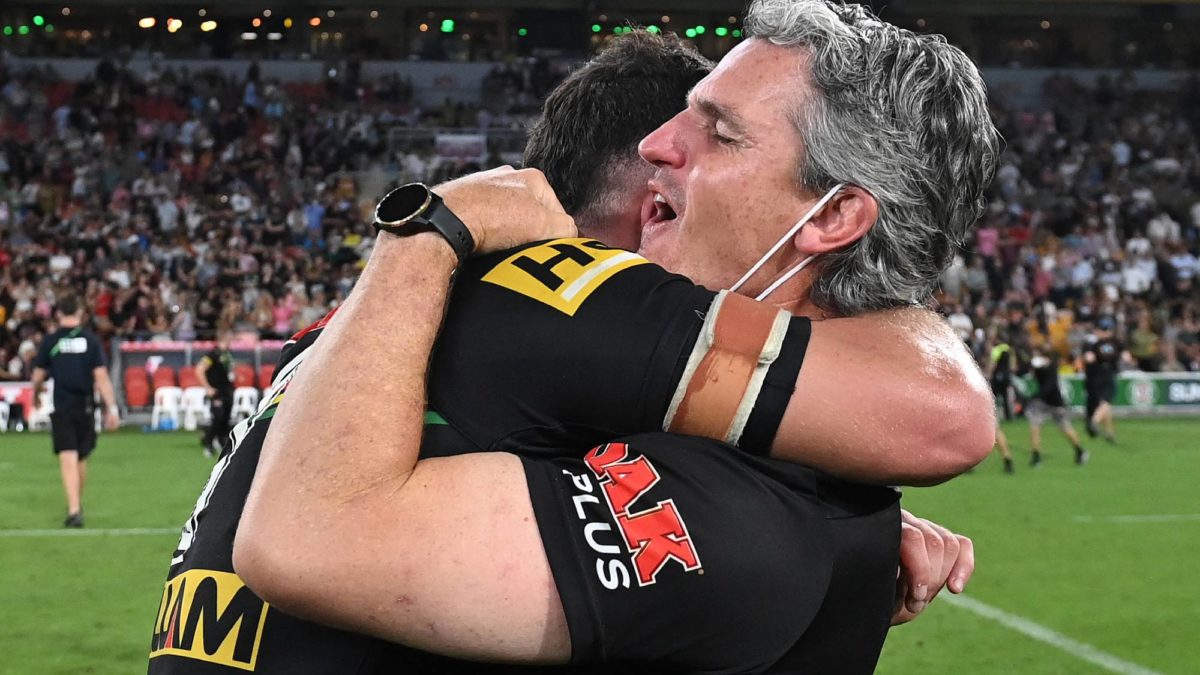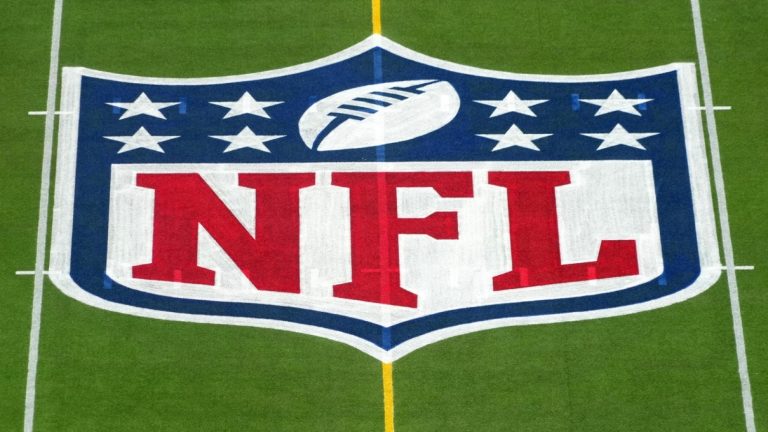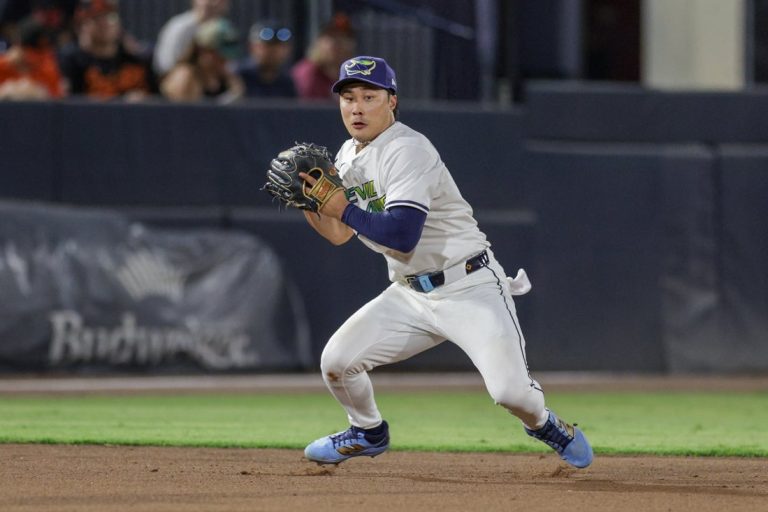Not long ago, the Penrith Panthers were a brick wall in defence.
In 2021-22, with assistant coach Cameron Ciraldo serving as Ivan Cleary’s defensive guru (dubbed the “minister of defence”), Penrith conceded barely a dozen points per game.
They tackled efficiently, missed few tackles, and smothered opponents weekly. There were fears the defensive steel would wane when Ciraldo left Penrith after 2022 – fears initially unfounded as the Panthers actually improved to around 12 points against per game in 2023 under new coaches.
But fast-forward to 2024-25, and those cracks have widened into chasms.
In 2024, Penrith’s against average crept up to 15.8 points per game (still the NRL’s best that year), but the slippage was noticeable. Come early 2025, the floodgates truly opened – the premiers were leaking 29.5 points a game (ranked 14th).
That is more than double their usual stinginess and a shocking collapse for a team that prided itself on suffocating defence. The once-watertight tackle efficiency has dipped, and missed tackles have spiked. In a Round 2, 2025 loss to the Roosters, Penrith missed 46 tackles and completed only 71% of sets.
They conceded 38 points in that match, a game they were expected to win comfortably, highlighting how vulnerable their defensive systems have become. It was the Panthers’ first home loss to the Roosters in a decade and kicked off a five-game losing streak – unthinkable during their dominant years.
Meanwhile, Ciraldo’s defensive blueprint is thriving elsewhere. After joining Canterbury, he inherited the NRL’s worst defence in 2023 (the Bulldogs leaked 32 points a game that year)
Within one season, Ciraldo’s impact was clear: the Bulldogs conceded just 433 points in 2024 (18 per game, a 336-point improvement), the third-best defence in the league behind only Penrith and Cronulla.
Now in 2025, Canterbury boast the statistically best defence in the NRL, letting in only 58 points across their first five games – 11.6 points per game, the least of any team.
It’s as if the defensive DNA that made Penrith great has been transplanted to Belmore. Gorden Tallis and Matty Johns have openly wondered if Penrith’s current defensive woes are a “Ciraldo hangover”, with Ivan Cleary suddenly exposed without his former assistant’s input.
The contrast is striking: the Panthers’ fortress has crumbled just as the Bulldogs build a new one using the same blueprints.

Dylan Edwards passes. (Photo by Jeremy Ng/Getty Images)
Penrith’s attacking machine has also lost some teeth since offensive assistant Andrew Webster departed at the end of 2022. During Webster’s tenure, the Panthers were as potent in attack as they were miserly in defence. In early 2021, for example, Penrith racked up 110 points in the first four rounds (second-best in the NRL at that stage), and across 2021-22 they regularly averaged around 25+ points per game.
Webster had taken over from Trent Barrett as attacking coach and actually made the Panthers’ attack even more dangerous in 2021. Line breaks flowed, completion rates were high, and the “Black Attack” was both slick and relentless. The Panthers could beat teams with flashy backline moves or grind them down through error-free sets – often doing both on any given week.
Since Webster’s exit to the Warriors, however, Penrith’s attack has at times looked clunky and predictable. In 2024, the Panthers “failed to click as it had in recent years”, struggling for fluency especially when star half Nathan Cleary was out injured.
They still managed enough points to win games (and ultimately a fourth straight premiership), but the aura of attacking inevitability wasn’t quite the same.
Penrith were held to eight points in their 2024 season opener and even suffered back-to-back mid-season losses to the Warriors and lowly Dragons, signaling that the days of effortlessly posting 30 points on any opponent were over. Their season total of tries scored dipped and they leaned more on defence to scrape by.
The Grand Final itself was a grind-it-out 14–6 affair, a far cry from the free-flowing scoring of prior years. On the flip side, Webster has exported Penrith’s attacking fundamentals to New Zealand with great success.
The Warriors in 2023 played with a discipline and pressure that uncannily resembled Penrith’s premiership blueprint. They often topped the league in set completion, finishing sets at an NRL-best ~83% rate.
The once-flamboyant but inconsistent Warriors became a smart, patient outfit that eschewed risky offloads, grinding teams down with high completion rates and relentless pressure. The result? A top-four finish in 2023, with the Warriors scoring 111 tries that year and mounting sustained attacking pressure much like Penrith did at their peak.
Even in 2024 when the Warriors fell back to 13th, they still had the second-best set completion rate in the NRL – a testament to Webster’s structured approach. In short, Webster took the Panthers’ attacking template across the ditch, and it prospered, while Penrith’s own attack sometimes sputtered without him steering the ship.
All dynasties eventually face a downturn, but the speed of Penrith’s decline in 2024-25 has been startling. The club lost not just some star players over the years, but also the two key architects of their systems in Ciraldo and Webster.
Ivan Cleary, widely (and rightly) praised as a top coach, suddenly looks short on answers as the Panthers drop games in ways they never did during their four-year reign.
The data tells much of the story: defensive lapses are up, points conceded have almost doubled, and the once-clinical attack has lost its sheen. Cleary finds himself without the tactical brains trust that underpinned his success, and the onus is now on him to adapt.
The clear opinion emerging from this decline is that Penrith must overhaul its assistant coaching structure and forge a new brains trust if they are to rise again. Great head coaches often surround themselves with great minds – the Bellamys and Bennetts of the league always have savvy assistants driving innovations. Cleary will need to do the same.
Whether it’s bringing in proven tacticians or promoting the next Ciraldo/Webster from within, Penrith needs fresh ideas and voices in the coaching box.
The Panthers still boast a talented playing roster, but without the sophisticated defensive patterns and attacking clarity of their recent past, that talent has looked surprisingly mortal. Four premierships in four years don’t happen by accident – they were built on excellent systems and coaching collaboration. Now, with those systems faltering, it’s evident just how influential those departed lieutenants were.
Ivan Cleary’s challenge is to rebuild that collaborative genius with a new set of assistants. If he can’t, the Panthers’ era of dominance may well be over.
But if he can reassemble a new coaching brain trust to support and challenge him, Penrith has the roster to climb back to the top. In the NRL, no empire stays on top alone; for the Panthers, the message is clear: get the right brains back in the operation, or keep sliding back to the pack.






